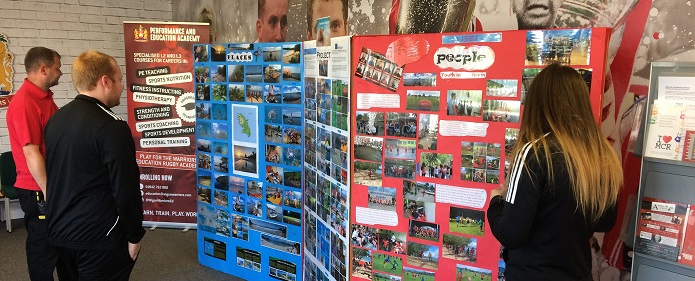
Discover how exhibitions and presentations can give students a ‘voice’ which impacts both trainees and organisations.
Everything is Possible, a York-based not-for-profit organisation, runs various Erasmus+ funded projects. Its latest, called ‘Moving Feet Opening Minds’ doesn’t just offer exciting work opportunities - but also encourages trainees to share their stories.
Targeting young people from disadvantaged backgrounds - the initiative will send 353 vocational education and training (VET) students abroad on work experience placements over a two-year period.
Co-ordinator Clair Brown explains: “A lot of the participants we’re working with fall into the category of thinking, ‘These international opportunities aren’t for me, they’re for people with money or people with degrees'. It’s really a case of trying to bring these exciting opportunities to participants that maybe, in the past, haven’t had those chances.”
From Aruban animal sanctuaries to rugby in Martinique
'Moving Feet Opening Minds' offers a wide range of short or long-term work placements for students with partner organisations based in Malta, Aruba, Sweden, Spain, Martinique and Croatia covering skills as diverse as animal husbandry, sports management, carpentry and more.
 These opportunities give students incredible experiences that they would not get in the UK, says Clair.
These opportunities give students incredible experiences that they would not get in the UK, says Clair.
In Martinique the trainees are involved in football activities and experience how it is coached in a different way to the UK. They also offer rugby sessions, giving the trainees coaching experience and offering local children and young people exposure to a sport which is not prevalent in their country.
“Our students also have opportunities to work in yoles, a type of boat that doesn’t exist anywhere else. They’re all involved in yole sailing, yole racing and learning how to use this particular boat.”
Giving students a ‘voice’
While the project seeks to increase students’ employability another key aspect is raising visibility of the learners themselves and the programme. Clair explains: “For many of the young people we work with, this is their first real achievement. We’re working with young people many of whom haven’t had positive experiences in their life.
"We want them to sell their story and to say what they’ve done and give the visibility to them as well as to partners and the Erasmus+ programme."
This encouragement starts even before the participants go abroad.
“We deliver a workshop looking at dissemination, the different opportunities they could have to share their experience," says Clair.
“I would recommend such a placement to any parent, as it is a wonderful opportunity for any young person.”
“If someone was on a long-term project, we would expect regular updates. When a trainee is undertaking a two-week project, we give various options of how they can collect and share their experiences, supported by their tutor.”
These include producing project guides, how-to guides and exhibitions, which give an in-depth look at their experiences, and returning groups are also encouraged to present their experiences to students preparing to undertake their own project, giving them a first-hand insight into what to expect.
“It’s all about confidence building, raising self-esteem and that’s a very nice element of the visibility that we deliver using peer-to-peer methodology,” adds Clair.
Sparking personal and professional development
“I think a noticeable benefit for our participants is their growth in self-confidence. Many of the students will have little experience of travelling beforehand, with some not even having a passport."
Personal development is just as important as professional development. “All of our projects have self-catering accommodation, so, with participants usually being quite young and often living at home, these are huge personal development steps.”
One student who benefitted hugely from the project is Sarah Donnellan, who was offered two-week placement at a donkey sanctuary in Aruba as well as visiting the local veterinary practice and dog grooming salon.
“Being at the sanctuary allowed the development of organisational and team working skills," she says. "I learnt that working with people of a different culture, with multiple languages, can be challenging but is rewarding and unifying.”
Sarah’s mother, Jayne, also saw the placement as a “fantastic opportunity” and has witnessed the project’s positive impact on her daughter.
“I feel she came home with much more self-confidence and self-belief, both in her abilities and her ability to cope without her family with her. She has become more self-reliant as she had to look after herself whilst in Aruba.
“I would recommend such a placement to any parent, as it is a wonderful opportunity for any young person.”
Since her experience, Sarah is now looking to take part in a long-term placement and hopes to continue building her skills, not just in the working world. “The two-week project had an big impact on my personal and professional development,” she concludes.
(Video above courtesy of Raphael Harfaux)
Top Tips for Successful Partnerships
Partnerships are the key to Everything Is Possible's placements and Clair’s advice for organisations new to Erasmus+ is: “Form solid partnerships. We’ve worked with partners for 10-12 years, what makes it work is having partners you can trust, partners where you can build on your relationships.
“The other thing that’s extremely beneficial, and it’s not always possible for the partners, is to offer reciprocity. I think you have a stronger relationship when you can offer something back and through 'Moving Feet Opening Minds', the reciprocity offered is that we hosting incoming tutors.”
Interested to learn more about the different ways to raise your Erasmus+ project’s visibility? Find out more on our promotion and dissemination webpage.
